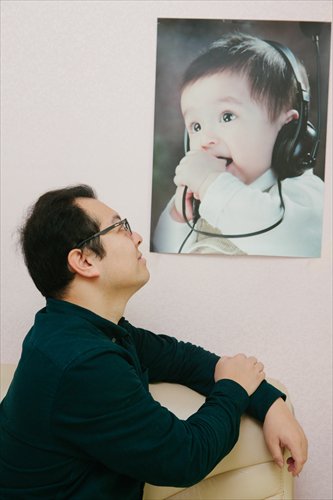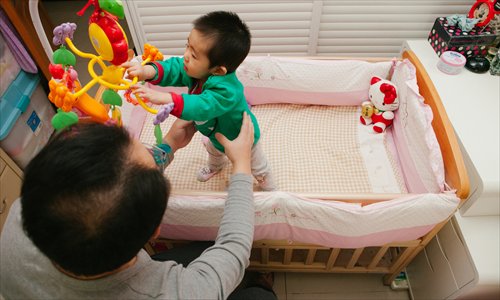Healthy sperm = healthy baby
Dad’s age can affect babies’ mental health, too

China's two-child policy brings "advanced paternal age" and its impact on offspring to the fore. Photo: Li Hao/GT
Becoming a mother after the age of 35 is never easy. Not only does the "advanced maternal age" of the would-be mom make getting pregnant and carrying the child to term tricky but it also poses certain risks to the health and well-being of the child. As a result of this, the burden of responsibility for having a healthy child had largely rested on the shoulders of the woman, that is, until now.
Studies have found that it is unfair to blame solely the mother's age for abnormality of the infant, as the age of the father is also a contributing factor in many developmental disorders, including Down syndrome, which has long been linked to the mother's age.
But the issue still has not got enough attention from the public. In an Atlantic report published in November, it was cited that although some studies have revealed that the father's age could increase the risk of Down syndrome, few people pay attention to it.
In late October, China loosened its decades-long family planning policy, allowing all couples to have two children. According to an article by the Yangcheng Evening Post in October, about 80 percent of the men born in the 1970s surveyed by the newspaper want to have a second child.
"Those Western studies on the fathers' age and their child's health are valuable and can be used as a reference. There will be many older men wanting a second child after the implementation of the two-child policy, " said Guo Jun, director of andrology at the Xiyuan Hospital of China Academy of Chinese Medical Sciences in Beijing.
Ignored problems in China
After the announcement of the two-child policy, Yang Wenzhuang, a deputy director at the National Health and Family Planning Commission, said that there are more than 90 million couples in China who are eligible for a second child, in an interview with the China National Radio.
"Some 60 percent of the women of childbearing age are more than 35 years old," said Yang.
Thirty-five is considered an "advanced maternal age" in women worldwide. However, there are no statistics indicating the "advanced paternal age" in men, and it is not yet known how many eligible Chinese men fall into this bracket.
Discussion about this issue is still rare in China, and a search on the impact of the father's age on their offspring yields only Western studies.
Liao Zhi, a Chengdu-based obstetrician, told Metropolitan that many women over the age of 40 come to consult her about having a second child.
"Those older mothers have a strong sense of the necessity of doing tests to guarantee their child's health. Although some men accompany their wives to the hospital, I seldom hear of them also doing tests," Liao said.
According to Liao, women over 35 normally do an amniocentesis examination, a test on the fluid in the womb to check for chromosomal abnormalities and infections in the fetus.
Women under 35 usually do a Down syndrome test on blood drawn from them when their pregnancy reaches 16 weeks, she said.
Lu Shaoming, the head of the advanced laboratory of the Reproductive Hospital affiliated with Shandong University, said that the men he sees are generally more concerned about their ability to reproduce.
"I have only encountered men who come here to do tests to see whether they are fertile at an older age, rather than out of concern for the child's health."

Experts advise fathers over 40 to first undergo semen testing before deciding to have a child. Photo: Li Hao/GT
Advanced paternal age issue
Geneticists Helga Toriello and Jeanne Meck, who co-authored a guideline for genetic counseling for older men, told the Atlantic that the medical community has yet to define "advanced paternal age."
"Some studies look at [men] over 40, some over 50, some over 35," Toriello said.
Lu believes 40 should be the threshold as fathers over this age tend to have sperm quality and stability problems, resulting in a decrease in fertility and a higher risk of having an unhealthy child.
Guo told Metropolitan that the sperm of men between the ages of 20 and 29 are the best quality.
"For men, especially those over 40, their sperm survival rate and sperm quality decrease sharply with age," Guo said.
According to the Atlantic, a study looking into New York State health records revealed that for parents aged over 40, the father's contribution to Down syndrome could be as high as 50 percent.
Harry Fisch, a professor of urology at Weill Cornell Medical College, told the Atlantic that, "For genetic abnormalities, it's not just a woman's problem anymore."
"The fact that couples are waiting longer to have children makes this very significant," he said.
The paternal age has also been regarded as a contributing factor in some relatively rare genetic disorders like Klinefelter syndrome and dwarfism, read the report.
Outside of Down syndrome, scientists have discovered that the age of the man may cause psychological problems in their offspring.
Christina Hultman, an epidemiologist at the Karolinska Institute, found in a 2010 meta-analysis that men between the ages of 40 and 49 were 1.4 times more likely to have children with autism than men between the ages of 15 to 29, which is the study's reference group. The risk of autism also increased significantly with age. Between the ages of 50 and 54, men were 2.2 times more likely to have children with autism compared with the reference group, according to the Scientific American report.
A Malaysian Mental Health Survey (MMHS) found that children with older parents and those whose fathers were at least 11 years older than their mothers, have a higher risk of mental health problems including anxiety, depression, obsessive-compulsive disorder and phobias, the Scientific American reported.
To be a healthy older father
Noting that child-rearing is the responsibility of both parents, Lu said men, especially older men, can do something to fend off possible health risks.
He suggested older men first undergo a test to check the stability of the sperm nucleus and their chromosomes if they want to have a child.
"The older men can do a sperm DNA fragmentation test to see whether they are in good condition to have a healthy baby," he said.
"The result can be used as a reference. But it does not mean they cannot have a healthy child if the test results are negative," Lu said.
Sperm DNA fragmentation tests often provide patients with information about their sperm quality and integrity, Lu explained.
He stressed that there is still much research to be done regarding the paternal age issue and that older would-be fathers should not feel too blue if their sperm is not qualified.
"If the father's sperm has problems that cannot be treated, they can resort to in vitro fertilization," Lu said.
According to Guo, it is better for the older would-be fathers to have a full body assessment.
For men who are over 40 and have diseases like diabetes and high blood pressure, Guo suggested they refrain from having a child as they may pass down these conditions to their children.
As for the men whose sperm are not good, they should have treatment for a period of time.
"[They should consider] taking traditional medicines to boost kidney function and improve blood circulation," he said.